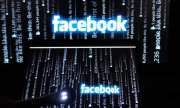Emotions replace news: Facebook changes news feed
Facebook plans to change its algorithm for its news feed service. In future, posts by individuals will be prioritised while posts by media, companies and other institutions will sink in the hierarchy - unless they go viral or are paid for. Will this move boost Facebook's credibility?
Like handing out crystal meth at the pub
The Süddeutsche Zeitung voices scathing criticism of Zuckerberg's plans:
“The things that work best on social networks are outrage, anger and fear. That's what gets users to share and comment. Humour and enthusiasm trail a long way behind. This is deeply lodged in the company's DNA. ... So Zuckerberg's plan to emotionalise Facebook is like going into a pub where tensions are running high, putting a sack of crystal meth on the table and wishing everyone a pleasant evening. The pub-goers would no doubt stay there well into the evening, but they'd also likely soon be at each others' throats. True: this happens only virtually on the Internet. Nevertheless the impact this will have on society should be taken very seriously.”
Filter bubble becoming ever tighter
NRC Handelsblad also doubts that the change of course will limit the spread of fake news:
“The chosen alternative of limiting the amount of news is an intervention that many people in countries with restricted press freedom won't thank the company for. Those willing to pay will still get on the timeline. For the rest, this will depend mainly on users' willingness to share news articles with their friends in the context of 'meaningful interactions'. It is not inconceivable that sensational content will have even better chances. And that the 'bubble' in which users are constantly confirmed in their views will only become ever tighter.”
Less time-wasting
For Amid Faljaoui, editor-in-chief of the weekly magazine Trends-Tendances, Zuckerberg's decision seems unreasonable:
“One wonders what impact this will have on the spread of fake news. After all, it's above all videos and links shared by family and friends that are responsible for fake information going viral on social networks. So the whole thing's rather bizarre. At the same time, what is certain is that this change in Facebook's News Feed will reduce the amount of time users spend on the network. It's all too often forgotten that the difference between Google and Facebook is that Google makes its money by helping us save time with our research, while Facebook earns its money by making us waste our time in front of our monitors!”
Media freed from their dependency
The harmful symbiosis between Facebook and the media must end, Club Z's chief columnist Ivan Bedrov counters, welcoming the move:
“Over the last ten years media across the globe have become dependent on Facebook. We were told: make attractive headlines to be shared, so we did. Publish on Facebook first so that you're right at the top of the list, so we did. Give us money so we get readers for you, so we did. Either you played along or you were out of the game. Meanwhile readers have forgotten how to be responsible and check what they read and share. ... Now we're on the right path. If you want to be informed you have to look for the information yourself. ... It's up to us media now to build trust so that you read our news and commentary.”

